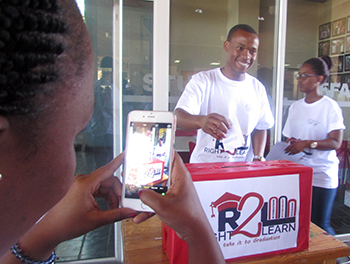Latest News Archive
Please select Category, Year, and then Month to display items
14 June 2024
|
Story Anthony Mthembu
|
Photo Suplied
 Jeremiah Hlahla, a UFS student completing his PhD in Botany at the University of Debrecen as part of an exchange initiative funded by the Erasmus+ Mobility Programme.
Jeremiah Hlahla, a UFS student completing his PhD in Botany at the University of Debrecen as part of an exchange initiative funded by the Erasmus+ Mobility Programme.
As part of an exchange initiative facilitated by the Erasmus+ Mobility Programme, Jeremiah Hlahla, a student at the University of the Free State (UFS), is nearing the completion of his PhD studies at the University of Debrecen in Hungary. Hlahla’s journey, which began in February 2024 and is set to conclude in July 2024, has been a remarkable learning opportunity. “As a first time-traveller to Europe, I have thoroughly enjoyed engaging with people from different countries and cultures,” he said.
The benefits of international collaboration
Hlahla is currently pursuing a PhD in Botany, focusing on plant stress physiology. “My current PhD project investigates the physiological, biochemical and morphological responses of vegetable-type soybean, or edamame, to combined drought and heat stress,’’ he explained. He considers the University of Debrecen the ideal institution to complete his research due to its extensive expertise and resources in similar projects. He noted that his colleagues at Debrecen conduct significant work on plant protection against biotic and abiotic stresses, including salt and drought stress, as well as proteins and amino acids in barley and other legumes.
Given the vast knowledge available on similar projects, Hlahla has found substantial engagement with his work at the University of Debrecen. “Upon arrival, I delivered an introductory lecture presenting my UFS project on the synergistic effects of combined drought and heat stress on the physiology and biochemistry of edamame. It was an engaging session as everyone could relate to my work and asked many questions,’’ he said.
Insights gained from the exchange
Hlahla has also gained valuable lessons that will assist him in his research career, including biotechnology and physiology tools. “I learned how to prepare samples and use high-performance liquid chromatography (HPLC) and reversed-phase ultra-high-performance liquid chromatography (UHPLC) to quantify proteins and amino acids,’’ he said. These techniques are beneficial not only for his current work but will also support future soybean research.
As his experience at the University of Debrecen nears its end, Hlahla reflects on the collaborations and friendships he has formed, which stand out as a significant highlight.
Right to Learn campaign seeks to fund financially needy students
2015-11-11
 SRC President, Lindokuhle Ntuli, pledges financial support to the Right to Learn campaign.
Photo: Tango Twasa |
In response to the dire need for financial relief for academically deserving students from underprivileged backgrounds, the Student Representative Council (SRC) of the University of the Free State (UFS) launched the Right to Learn campaign on Friday 30 October 2015. The campaign, which aims to counter deregistration, was initiated following the national #FeesMustFall campaign, which gained momentum after students from the University of Witwatersrand first mobilised against the proposed fee increases for 2016.
The SRC’s Projects Committee realised that, although President Jacob Zuma had consented to a 0% increment, the lack of an increase would not eliminate the financial burden currently facing some students.
“The campaign was conceived at the SRC’s strategic planning meeting, and is now spearheaded by the SRCs Projects Committee,” said Letsika Leqoalane, SRC: Academic Affairs. “The campaign was founded on the university's value of ‘Superior Scholarship’ and the SRC’s value of reducing student financial exclusions,” he added.
Students in pursuit of continued access to education
The Right to Learn campaign was established as a supplementary initiative to the #FeesMustFall movement. “The Right to Learn campaign is an initiative to raise funds for students who are facing financial exclusion in the coming year,” said the SRC Academics Affairs officer.
All proceeds will be channeled towards reducing the number of students who will face de-registration in 2016, the SRC textbook bursary, and food bursaries. “This campaign stands on three pillars, namely: no to de-registration, no to student food insecurity, and yes to textbooks,” explained Leqoalane.
A call for support
According to SRC President, Lindokuhle Ntuli, “SRC members have made pledges of no less than R500 each from their own pockets.” The SRC is appealing to the UFS community to make donations into the campaign bank account, and thereafter to email the proof of payment to Ntuli at NtuliL@ufs.ac.za. The account details are:
Account number: 15-7085-0721 ABSA Bank Branch
Reference: SRC FUND
Branch Code: 632005 Cheque Account
Swift code: ABSAZAJJ